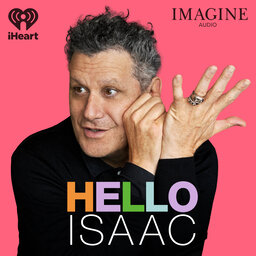Sex Advice Columnist & Activist, Dan Savage
Isaac Mizrahi chats with Dan Savage about how he handles trolls, how gay and straight culture have impacted and informed each other, underwear parties and more.
Follow Hello Isaac on @helloisaacpodcast on Instagram and TikTok, Isaac @imisaacmizrahi on Instagram and TikTok and Dan Savage on Instagram @dansavage.
(Recorded on August 30, 2023)
In 1 playlist(s)
Hello Isaac with Isaac Mizrahi
Isaac Mizrahi is an expert - at almost everything! He’s an iconic fashion designer, actor, singer, …Social links
Follow podcast
Recent clips

Emmy-Winning Actor and Director, Pamela Adlon
51:37

Interior Designer & TV Host, Jeremiah Brent
49:51

Podcast Host & Crooked Media Co-Founder, Jon Lovett
50:53
 Hello Isaac with Isaac Mizrahi
Hello Isaac with Isaac Mizrahi